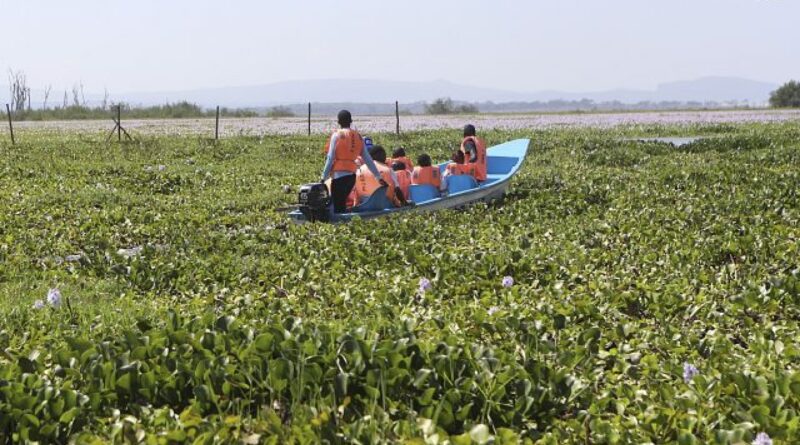Kenyan start-up turning invasive plant into biodegradable packaging
The popular Lake Naivasha, a few hours drive north-west of the Kenyan capital, Nairobi, is famous for its flamingos and hippos.
But the lake is being invaded by invasive water hyacinths which are threatening the livelihoods of local fishermen.
The engines of their small boats and nets regularly get snarled up in the carpet of green. And with reduced oxygen in the water, there are fewer fish.
Fisherman Simon Macharia says he used to catch a good amount of fish before the water hyacinth invaded.
“But when it affected the breeding zones, the fish decreased. We used to catch up to 90 kilogrammes per day but now we get between 10 and 15 kilogrammes,” he said.
But now a young Kenyan, Joseph Nguthiru, has come up with a solution that started as a final year university project, following a disastrous field excursion that left him and his classmates stuck on Lake Naivasha.
His company, HyaPak, is working with the fishermen, harvesting the plant and transforming it into biodegradable packaging.
“What we are trying to look at is, how do we use one problem which is water hyacinth to solve the other problem which is plastic waste pollution,” says Nguthiru.
“How we do this is that we work together with fishermen who are affected at the lake, and we contract them to harvest the water hyacinth for us.”
The plant is dried on site and then transported to HyaPak’s facilities where it is combined with binders and additives, which is then mixed and shaped.
Nguthiru says the company is looking into spaces that have high plastic use but need to go sustainable and go green.
“One of these is agriculture, where we have a lot of seedlings being packaged in plastic bags,” he says.
“We have our biodegradable bags that are inserted with the seedlings into the ground. As they decompose the release nutrients that accelerate the growth rate of plants as well reducing the amount of water used in irrigation.”
HyaPak is already exporting to the United States and Germany, and it has plans to establish franchises in India and El Salvador, two countries that are also experiencing problems with the invasive plant.

